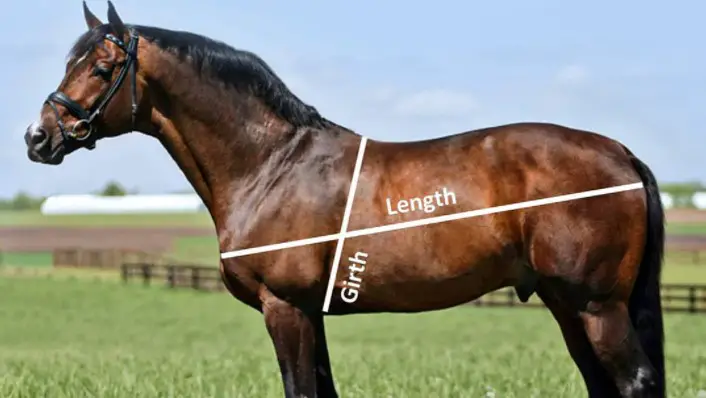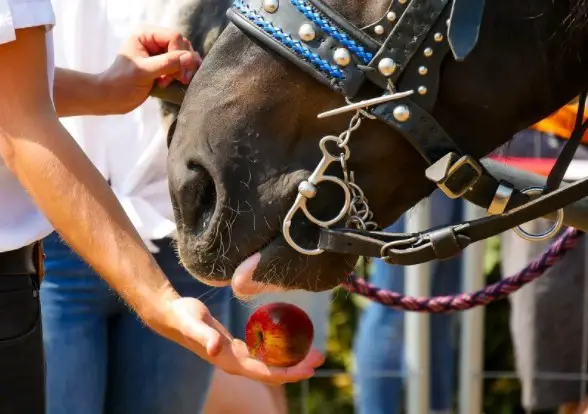Thoroughbred horses are the perfect sport horses for athletics. They run with remarkable speed, have a competitive spirit, and achieve glorious moments with their riders.
However, if you have ever wondered about the average weight of this breed, then you are not alone. With different measurement methods and other considerations, the average weight often differs.
In this article, you will learn all you need to know about the average weight of a thoroughbred horse.
What are Thoroughbred Horses?
Thoroughbred Horses are selective breeds that arguably make the perfect choice for horse racing. Originating from England, they are renowned for their speed, agility, and competitive spirit. They have delicate heads, lean bodies, broad chests, and long back legs. With an average height of 64 inches (163cm), they range in various colors such as brown, bay, chestnut, gray, or black. Thanks to their long back legs, they are athletic, fast, and renowned for equine activities, including hunting, running, jumping, and racing.
Average Horse Weight
The average weight of a thoroughbred breed often depends on varying factors such as their diet, type of training, gender, age, and more. However, there is always an estimated size of these breeds.

With long legs and a broad chest, the average weight of a young thoroughbred horse is between 1036 to 1135. However, this weight begins to change when their body structure changes. Just like humans, they develop bone or muscle mass, influencing their weight. Hence, as the age increases, the weight also increases. For adult male horses, the maximum weight is approximately 1,292 pounds. Meanwhile, the female breeds weigh a maximum size of 1,080.
How to Weight Horses
A horse’s weight can be taken through different methods. It all depends on the choice of the owner. However, some methods are more notable than others. Here are three methods that are used in weighing a horse.

1. Livestock Scale
Livestock scales are effective tools for weighing a horse. Just like humans step on weighing scales, horses step on these livestock scales. These scales are extra large and give accurate data when stepped upon. You can find one in a vet hospital or an equine clinic.
2. Weight tapes
Weight takes are another popular method of measuring a horse’s weight. They are similar to the usual measuring tapes wrapped around a body. Two individuals can utilize this method to get actual data or the estimated value. Here is a guideline on how to utilize the weight tape.
- First, measure the horse’s length. The length is the point of a horse’s shoulder towards its rear side.
- Next, measure the heart girth (circumference). The heart girth is the highest part of the withers just behind the elbow. You have to measure this twice.
- Then, input the values into the formula. The weight formula is measured thus; (Heart Girth × Heart Girth × Length) / 330°.
However, the constant value (330°) changes depending on the size of the horse. If it is a matured horse, you can use 330°. For yearlings, the constant value is 301 lbs. Meanwhile, the constant value of a weanling is 280 lbs, and a pony’s constant value is 299 lbs.
3. Online Calculators
Online calculators utilize formulas to get an estimate of the horse’s weight. The results are always an estimated value, not an actual one that a scale or weight tape can give you.
Factors that Influence a Horse’s Weight
Several factors influence the weight of a horse. Among these are:
Diet
Diet influences the weight of a horse. The weight does depend on the type of feed, supplement, and ratio given to the horse. For instance, a horse that takes only grass may not have high body weight, unlike a horse that takes grains and other supplements. That is not to say that grass alone isn’t good. Instead, the horse should be given a balanced meal to contribute to his weight. Besides, the quality of the feed is also important. It affects the body structure in terms of muscle mass. Hence, the owner or trainer of a horse should think critically and feed his horse with the best feed. What he adds or eliminates to their meal’s diet all contribute to a horse’s weight.

Type of training
The training a horse undergoes influences its weight. Disciplines such as racing, hanger rings, or reining will affect its weight and, sometimes, its health. For instance, the thoroughbred horse often has a slim shape, unlike other breeds that are jump rings or hangers (trail horses). In situations like this, one needs to be considerate and provide the needed resources to the horse. Resources such as feed, water, and grazing lands should be available.
Location/Climate
The location and climate of the horse’s habitat often affect its weight. A horse in a land with plenty of grass or hay will tend to feed well and develop body mass, unlike a horse in an environment with lesser grass or hay. Such horses have to depend on the quota given by the owner each day.
Why you should know your horse’s weight
Knowing a horse’s weight is an important task of horse rearing. It avoids many red flags and contributes to the growth of the horse. Here are some reasons why you should consider knowing your horse’s weight.
- To consider and understand a horse’s feeding habit
- To monitor seasonal changes
- To detect medical problems and understand the right prescription
- To understand your true’s ability even during sporting events.
Conclusion
The average weight of a horse depends on its age, gender, feeding habits, location, and training. However, it is essential to determine your horse’s type to get its weight’s true value.
